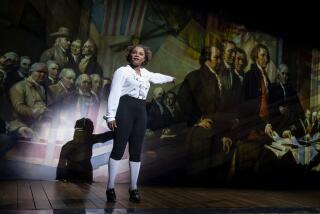Inspecting America’s foundation
- Share via
To Begin the World Anew
The Genius and Ambiguities of the American Founders
Bernard Bailyn
Alfred A. Knopf: 208 pp., $26
*
From his lifetime to this day, Thomas Jefferson has been extravagantly praised and roughly, even savagely, treated. Some recent historians have called him a hypocrite, a writer of only modest abilities, a slave-owning racist and precursor of Theodore Bilbo and Strom Thurmond, an ineffectual dreamer miscast as the “apostle of freedom.” Scholar and statesman Conor Cruise O’Brien wrote that the 20th century statesman Jefferson would have most admired is Cambodia’s Pol Pot.
In his bestselling “John Adams,” David McCullough lamely tries to be fair to Jefferson even as he idealizes and sentimentalizes his neo-Puritan subject, but he regularly slips into disparaging remarks, as when he writes that “in matters of [household] economy, as in other aspects of his life, Jefferson did not practice what he preached.”
It is the great merit of Bernard Bailyn’s new collection of essays “To Begin the World Anew” that it redresses, for our time, the balance of historical judgment on Thomas Jefferson. Bailyn, author of “The Ideological Origins of the American Revolution” and “The Peopling of British North America,” among other influential books, is one of America’s most discerning historians.
His thinking is subtle. His style is forceful. And he is not afraid to look ambiguities square in the eye. In his 22-page essay “Jefferson and the Ambiguities of Freedom,” he deftly sketches the ground from which Jefferson sprang, his inculcation in the Enlightenment, his fear of the abuse of power and his own situation as a slave-owning Virginia planter. Jefferson, Bailyn writes, “had caught a vision, as a precocious leader of the American Revolution, of a comprehensive Enlightenment ideal, a glimpse of what a wholly enlightened world might be, and strove to make it real, discovering as he did so the intractable dilemmas. Repeatedly he saw a pure vision, conceptualized and verbalized it brilliantly, and then struggled to relate it to reality, shifting, twisting, maneuvering backward and forward as he did so.”
Bailyn writes that Jefferson was “simultaneously a radical utopian idealist and a hardheaded, adroit, at times cunning politician; a rhetorician, whose elegant phrases had propulsive power, and a no-nonsense administrator.”
Jefferson, distrusting power, was at first skeptical of the Constitution yet came to embrace it. Hating slavery, he may well have had relations with one of his slaves, but he supported its extension in the Southwest to preserve the Constitution. Fearing the power of a central bank because of the British experience of banking corruption, he later acknowledged the necessity of certain aspects of a centralized economy. Loathing political parties, he established the American party system.
Jefferson, Bailyn writes, “remained throughout his long career the clear voice of America’s Revolutionary ideology, its purest conscience, its most brilliant expositor, while struggling to deal with the intractable mass of the developing nation’s everyday problems. In this double role -- ideologist and practical politician, theorist and pragmatist -- he sought to realize the Revolution’s most glittering promise, and as he did so he discovered the inner complexities and ambiguities of those ideals as well as their strengths, and left a legacy of compromise and incompleteness which his critics would forever assail.”
Bailyn’s other essays in this book, if not as compelling or historically imperative as that on Jefferson, are nonetheless engaging. He deals at greater length with Benjamin Franklin in Paris as spokesman for the emerging democracy. Bailyn examines the Federalist Papers and its authors, James Madison, Alexander Hamilton and John Jay, as they, facing a six-week deadline, sought to marshal their arguments against clouds of doubt and premonitions of disaster. He traces the influence, weak and strong, of the Federalist Papers on Supreme Court decisions down to the present. He looks at the influence of the American Republic on Latin America and Europe.
Throughout he retains a sense of wonder that those men in a clump of distant British provinces could have wrought a political system, a view of the world, that is so imaginative and so enduring. As in his examination of Jefferson, Bailyn contemplates this new creation in the round, complete with its inconsistencies and ambiguities.
We have no need now, he writes, to create, as they did, the world anew. But we, as inheritors of their success, do have the obligation to ask as they did, he passionately asserts, “why things must be the way they are.”
More to Read
Sign up for our Book Club newsletter
Get the latest news, events and more from the Los Angeles Times Book Club, and help us get L.A. reading and talking.
You may occasionally receive promotional content from the Los Angeles Times.








